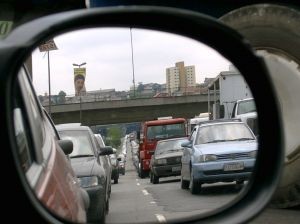 There are a number of traffic laws on the books for which a traffic police officer can issue you a citation. There are some violations that may earn you a night or two in jail, if you are not careful of the traffic laws in your state or visiting state.
There are a number of traffic laws on the books for which a traffic police officer can issue you a citation. There are some violations that may earn you a night or two in jail, if you are not careful of the traffic laws in your state or visiting state.
One common traffic violation is speeding, although it is considered as one of the most understood traffic rules. It is an immensely simple regulation to follow i.e. do not exceed the posted speed limit, and consider the driving conditions even when driving within the posted limit.
There is a common traffic myth that you will not be ticketed for speeding if you are driving with the flow of traffic. However, this is not true, and we explain in this blog post why pleading this type of reasoning to a police officer is probably not a good idea, and why you definitely don’t want to use this line of reasoning as your defense in court. There is one other myth associated with speeding that warrants an honorable mention.
Driving The Posted Speed Limit
There is a common assumption that driving the posted speed limit affords the driver an exemption from getting a speeding ticket. However, this is not completely accurate.
- As a general rule, driving the speed limit should protect you from speeding tickets but it is also important to understand that the posted speed limit is the maximum speed limit during optimal road conditions.
- So, as road conditions deteriorate, the maximum acceptable speed limit also decreases, though there is no set number.
- If a police officer deems that the speed at which you are traveling is not safe based on current conditions, they can pull you over and ticket you for speeding or reckless driving, even if you are driving at or below the speed limit.
- This type of traffic violation places little bit more of the burden on the police officer to prove that you were exceeding a speed that was safe, being that the determination of whether you were driving safe or not is subjective.
Nevertheless, it is important to understand that the posted speed limit is not an automatic number of traffic ticket exemptions.
Driving With The Flow Of Traffic
There is a longstanding myth that implies that driving with the flow of traffic is also an exemption from being ticketed by a law enforcement officer. This is far from true.
- The speed limit is the speed limit, and there are no recognizable excuses for exceeding the speed limit, other than making an emergency maneuver of some sorts.
- Attempting to use the traffic flow as a justification for you exceeding the speed limit will probably not turn out good for you with the police officer or in court.
- As far as the officer is concerned, attempting to use the traffic flow as an excuse for speeding will not only draw the ire of the officer, it may also be considered as an admission of guilt.
- Police officers can be easily annoyed when they believe that they are being fed some ridiculous explanation. You may fare better by simply saying, “I did not know that I was driving that fast; I’m sorry.”
Saying that you were speeding because you were driving with the flow of the traffic is an indirect way of admitting that you were speeding, making it more difficult to defend yourself later in the process.
Speaking of the process, you definitely do not want to use this type of reasoning with the judge, or you might as well simply pay the fine and save yourself a trip to the court. Others breaking the law is never a justifiable reason for you to break the law. Rather, you may consider taking the time to research the speeding laws and prepare for your court day.
There are a number of defenses that have proven to be effective in fighting speeding tickets, especially challenging the calibration and accuracy of the radar gun.
[Image: http://www.freeimages.com/photo/481997]
Scott Desind
Latest posts by Scott Desind (see all)
- How to Request the County Seat and Fight Your California Traffic Ticket - May 21, 2023
- Don’t Even Touch That Cell Phone - July 13, 2022
- Innocent Until Proven Guilty - March 2, 2020

